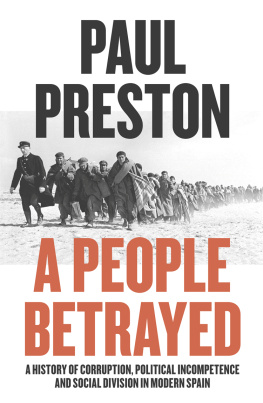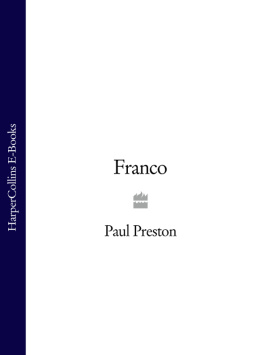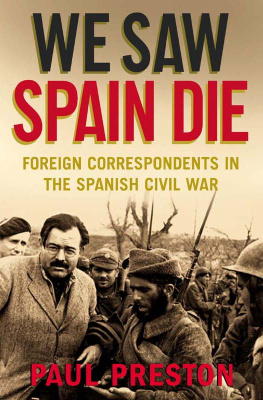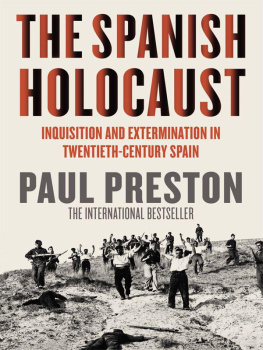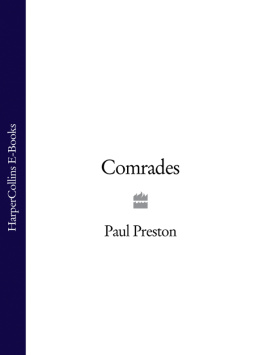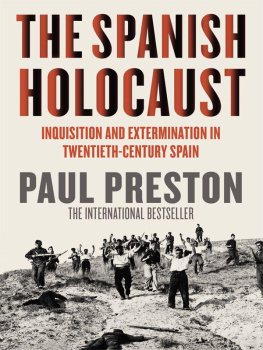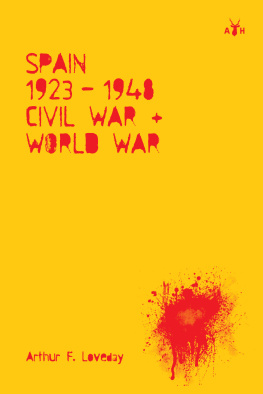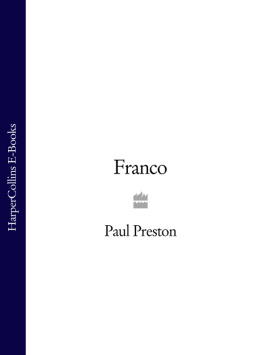William Collins
An imprint of HarperCollinsPublishers
1 London Bridge Street
London SE1 9GF
WilliamCollinsBooks.com
This eBook first published in Great Britain by William Collins in 2020
Copyright Paul Preston 2020
Paul Preston asserts the moral right to be identified as the author of this work
A catalogue record for this book is available from the British Library
Information on previously published material appears .
All rights reserved under International and Pan-American Copyright Conventions. By payment of the required fees, you have been granted the non-exclusive, non-transferable right to access and read the text of this e-book on screen. No part of this text may be reproduced, transmitted, down-loaded, decompiled, reverse engineered, or stored in or introduced into any information storage and retrieval system, in any form or by any means, whether electronic or mechanical, now known or hereinafter invented, without the express written permission of HarperCollins.
Source ISBN: 9780007558377
eBook Edition February 2020 ISBN: 9780007558384
Version: 2020-01-26
For Mara Jess Gonzlez
and
Linda Palfreeman
The philosopher Jos Ortega y Gasset wrote in 1921: Starting with the monarchy and moving on to the Church, no national authority has thought of anything but itself. When has the heart, after all foreign, of a Spanish monarch or of the Spanish Church ever beat for ends that were deeply Spanish? As far as is known, never. They have done the exact opposite. They have ensured that their ends have been adopted as if they were in the national interest.
Similar views were expressed in the nineteenth century by the English romantic travellers. The most celebrated, Richard Ford, author in 1845 of AHandbook for Travellers in Spain and one year later of Gatherings in Spain, portrayed ordinary Spaniards as generous and noble while referring constantly to bad government and misgovernment: The real permanent and standing cause of Spains thinly peopled state, want of cultivation, and abomination of desolation, is BAD GOVERNMENT, civil and religious. He claimed that, at all levels of government, there were despots always open to bribes.
The present volume is another work written by a British historian who loves Spain and one who has spent the last fifty years studying the countrys history. As might be deduced from its title, this book echoes the spirit of Richard Ford and of many Spanish commentators such as Lucas Mallada, Ricardo Macas Picavea, Joaqun Costa, Manuel Azaa and Jos Ortega y Gasset. While drawing on the perceptions of Ford, it does not adopt his simplistic comparisons of a benighted Spain with an idealized Britain. Equally, while deriving great insight from the critical analysis of the regenerationists, it does not share the view of Costa that the problem called for an authoritarian solution the iron surgeon. This book makes no attempt to suggest that Spain is unique in terms of corruption or governmental incompetence. There are other European nations for which, at various historical moments, similar interpretations might be valid. For instance, while writing the book, I have lived, on a daily basis for the last three years, under the shadow of the Brexit process in Britain. It has been a painful experience to have to witness the combination of lies, governmental ineptitude and corruption that have bitterly divided the nation and threatened to provoke the break-up of the United Kingdom.
There are many possible approaches to the rich and tragic history of Spain. This book spans the period from the restoration of the Borbn monarchy in 1874 with Alfonso XII, to the early days of the reign of his great-great-grandson Felipe VI in 2014. It aims to provide a comprehensive and reliable history of Spain with a dramatic emphasis on the way the countrys progress has been impeded by corruption and political incompetence. It demonstrates how these two features have resulted in a breakdown of social cohesion that has frequently been met with, and exacerbated by, the use of violence by the authorities. All three themes consistently emerge in the tensions between Madrid and Catalonia. Throughout the Restoration period, and most spectacularly during the Primo de Rivera dictatorship, institutional corruption and startling political incompetence were the norm. Popular disgust with this opened the way to the countrys first democracy, the Second Republic.
From the inception of the Republic in 1931 until its demise in 1939, corruption was less toxic, not least because the newly installed political elite was inspired by many of the propositions of the regenerationists. That is not to say corruption did not exist. A recurring character in the book, the multi-millionaire Juan March, who was behind some of the most spectacular corruption during the Primo de Rivera period, was equally active during the Republic, as indeed he would be in the first decades of the Franco dictatorship. This was also true of Alejandro Lerroux, an important politician who was on Marchs payroll. A lifetime of shameless corruption reached its peak when, as Prime Minister in 1935, Lerroux brazenly sponsored a system of fixed roulette wheels, an outrageous operation that gave rise to the word estraperlo which has become a synonym for economic malfeasance.
The victory of General Franco saw the establishment of a regime of terror and pillage which allowed him and his elite supporters to plunder with impunity, enriching themselves while giving free rein to the political ineptitude that prolonged Spains economic backwardness well into the 1950s. Ironically, throughout his life, Franco would express a fierce contempt for the political class that he held responsible for the loss of empire in 1898. In 1941, on the fifth anniversary of the outbreak of the civil war, he declared in a speech to the top brass of the Falange: when we started out in life we saw our childhood dominated by the contemptible incompetence of those men who abandoned half of the fatherlands territory to foreigners. In fact, some of his own fatuous errors would far outdo those of the predecessors he mocked. That he would not scruple to put his determination to stay in power above national interests can be seen in his relationships with the Third Reich and later with the United States. His scatterbrained get-rich-quick schemes, ranging from alchemy and synthetic water-based gasoline to the disaster of his autarkic policies, contributed to Spains backwardness until he was persuaded in 1959 to let others supervise the economy.
In denouncing politicians in 1941, Franco was far from alone. With brief intervals when optimism flowered, between 1931 and 1936 and the first decade of the rule of King Juan Carlos, the attitude of Spaniards towards their countrys political class has often been one of disdain bordering on despair. Belief in the incompetence and venality of politicians has been an underlying constant of Spanish life since the Napoleonic invasion if not before. Franco used rhetoric about corrupt politicians to justify a dictatorship under which corruption flourished unchecked and was indeed exploited ruthlessly by the Caudillo himself, both for his own enrichment and to manipulate his followers.
The humiliation of 1898 was just the final confirmation of a truth that had been coming for nearly a century. Spains internal economic problems could no longer be alleviated by imperial plunder. A backward agrarian economy, an uneven and feeble industrial sector, the heavy hand of the Catholic Church, parasitical armed forces and growing regional divisions were endemic burdens. They were perpetuated, as was perceived by the far-sighted polymath Joaqun Costa, by a corrupt and incompetent political system which blocked social and economic progress and kept the Spanish people in the servitude, ignorance and misery which lay behind the contemporary slur that Africa begins at the Pyrenees. However, the solution proposed by Costa, the iron surgeon, showed little confidence in the people and in democracy.

